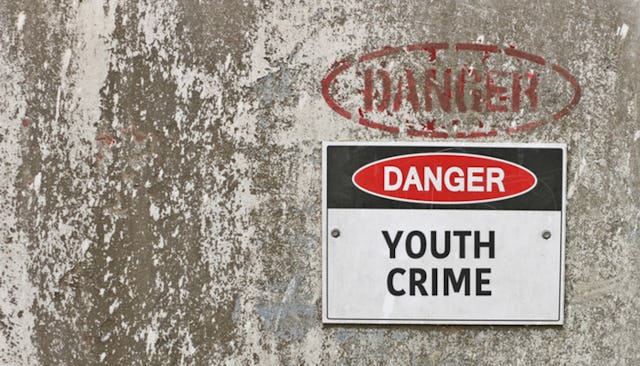Has A Decrease In Spanking Led To Higher Crime Rates? Nope.

When I was pregnant with my first baby, I found myself getting sucked into a BabyCenter community board debate on spanking.
I am not a spanker. I wasn’t raised by spankers. Spanking just isn’t something my family does. But I know it’s a common practice, so I wanted to understand the mindset that believes spanking is an appropriate disciplinary tool.
The discussions were eye-opening. Through that board and many other discussions since, I’ve realized there are often a few distinct categories of spankers.
First, you have the parents who rarely spank, reserving it only in desperate circumstances or for cases of immediate danger, such as a child running out into the road. This is the argument I see most often.
Second, you have the religious spankers, who quote Bible verses that they believe support striking a child for various character flaws and behaviors. (Interestingly, I watched a well-versed and articulate woman on that board go from spanking from a biblical perspective to becoming a non-spanker from a biblical perspective. So if you think the Bible is clear on such things, it’s not.)
And finally, you have the people who believe that spanking equals discipline and vice versa. These are the folks who say things like, “The reason we have so much crime these days is because parents don’t spank their kids anymore!” or “If parents were allowed to raise a hand to their children, we wouldn’t have so many delinquent kids!”
It’s this last category of pro-spanking parents that I’d like to address. Let’s go ahead and look at some facts and statistics regarding spanking and crime.
First of all, crime has not risen in the past couple of decades. Crime rates in the United States peaked in the early 1990s and have been steadily declining since then. And not by just a little. In fact, the homicide rates between 2010 and 2014 were as low as they were in the early 1950s.
Source: http://www.factcheck.org/2016/07/dueling-claims-on-crime-trend/
With the exception of 2015, which did see a small increase, violent crime and property crime have significantly decreased in the past three decades.
In other words, despite what some politicians would have us believe, we are not living in a historically dangerous time. We are safer than we’ve ever been since the iconic, “Leave it to Beaver” 1950s. The kids being raised in the past two and a half decades have actually been less likely to commit crimes than when we grew up.
So, now that we know that kids these days are not running around committing crimes (as they apparently were during our youth), what about spanking? How have our changing attitudes toward spanking correlated to those crime rates?
Source: www. fivethirtyeight.com
Between 1986 and 2014, favorable views of spanking have dropped from about 84% to 70%. Presumably, that shift in attitudes means fewer parents have used spanking as a means of discipline in the past few decades.
Has that shift in spanking attitudes resulted in higher crime rates? Clearly not.
We can’t really make such a sweeping generalization about a whole country, though, right? Aren’t there some places that are more dangerous than others and places where spanking is more or less common?
Well, yes. There are actually some interesting correlations when you look at regional crime rates and spanking attitudes. According to University of Chicago’s General Social Survey, people in the South are much more likely to favor spanking than people in the Northeast.
Source: www.fivethirtyeight.com
One might wonder how crime rate trends look in those regions. Considering the population centers concentrated in the Northeast (inner cities and whatnot), it’s natural to assume crime rates would be higher there than in the more Rural South.
However, that’s not the case.
Source: http://www.movoto.com/blog/opinions/crime-maps-over-time/
The pro-spanking South has higher crime rates than the less-pro-spanking Northeast. So again, the “kids are criminals because parents don’t spank anymore” argument doesn’t hold water. Across the board, we see a clear correlation between fewer parents endorsing spanking and lower crime rates.
Correlation is not causation, of course. But considering the research that’s been done in recent years about kids who are spanked showing more aggression and a greater tendency to break rules, perhaps we can draw some conclusions here. At the very least, we can say that spanking clearly doesn’t prevent crime. Without reaching for cause and effect, we can definitively say that greater numbers of parents who use corporal punishment appear to be associated with higher crime.
I don’t share this information to convince people of the evils of spanking. One thing I learned on those debate boards is that spanking can be done in a way that isn’t necessarily going to cause lifelong harm. I still don’t personally understand the need for it, as I’ve seen countless examples of parents raising awesome, responsible, respectful kids without it, but there are hundreds of ways to raise good kids. You do you.
However, if you think parents should spank because the world has gone to hell in a handbasket since spanking has decreased, you might want to rethink that stance. The numbers tell us that it’s not the prevention or cure for crime that many believe it to be. “Kids these days” are doing quite well in that department, without spanking as the go-to disciplinary choice.
This article was originally published on